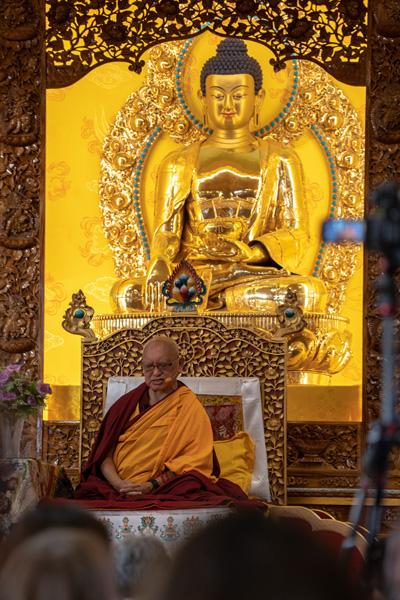Seeing the Suffering of Others
Lama Zopa Rinpoche teaches that when we think of the deep suffering of others, we have no choice; compassion must arise for them. This teaching is excerpted from Lecture Nine at the 52nd Kopan Course held at Kopan Monastery, Nepal, in November-December 2019. Lightly edited by Gordon McDougall.

We have had beginningless rebirths already numberless times. If we don’t meet the Dharma and practice it in this life, if we don’t do purification, purifying negative karma, if we don’t change our mind from a bad heart to a good heart, we will have to undergo numberless changes in the six realms again. Then we will be born as tigers and different animals eating meat, being unbelievably fearful for other animals, killing countless other animals. We will have to be born again like that numberless times. It’s so pitiful.
The reality is like that. Even if we know the word “lamrim” but we don’t practice, we don’t practice awareness, when we see sentient beings we don’t think that. The mind is totally in hallucination, not only ignorant of true existence but hallucinated, differentiating things as good and bad, causing attachment and anger and different delusions, such as pride and so forth, to arise. On the basis of [believing in] true existence, on that base hallucination, the different delusions arise. We live our whole life like that, in piles of hallucination.
It is so important to see this. I mentioned [walking along] the beach as an example. When we go to the market or wherever there are people, we must remember that. When we go shopping in the market, when we are in the street or in a cinema or restaurant, wherever we see many people, we must remember that these people have been suffering in the six realms from beginningless rebirths because they haven’t met the Dharma. And again in this life they don’t have the karma to meet the Dharma, so there is no way to practice. Their understanding is far from the Dharma. Not understanding karma, they are just like animals, only living for this life, nothing else. They will live for however many years, months or weeks—I don’t know—as a human being, and then the lower realms. [They have had lives in] the desire realm, the form realm and the formless realm numberless times; they have suffered numberless times. They can’t see the end of samsara. They have no idea. Their mind is totally skies of ignorance, totally dark, without any light.
Thinking like this, compassion must arise. We have no choice when we think of their deep suffering in the past and in the future. We have no choice; compassion must arise for them. That inspires us to practice the Dharma. That inspires us to practice the Dharma, to always study the Dharma, the Buddha’s teachings. Then, our mind wakes up more and more and more. The more we study, the more we wake up. The more we learn the correct Dharma, the more our mind wakes up.
Then, we are able to help others; we are better able to benefit others. That is the advantage of studying the Dharma. His Holiness gave general advice recently to many monasteries (although not related [solely] to monks), saying that even if we don’t believe in reincarnation, we should still study the Dharma. Just like science, it can help. His Holiness divides the Dharma into three parts and one part is the science of mind, to help the world, to help others. So, with compassion for others, when we want to help others, we have to develop ourselves.
